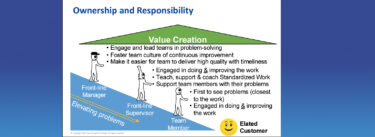For some 40 years, ever since I discovered the calculator, I haven’t practiced multiplication tables. The word processor, which I adopted in 1982, has freed me from making outlines. Google, Wikipedia, and virtual libraries have liberated me from the need to exercise my active mind or to invest in any preliminary thinking before learning a subject.
Over these 40 years, our ability to acquire data and information has been transformed. While our ability to acquire information has improved, I also fear that we are in a kind of knowledge management regression. Often, I feel that the muscles of my thinking, memory, and intuition have gone flabby. Maybe it’s my age, maybe it’s the attenuation of the muscles of my brain as I continue to avoid the frustration of learning, thanks to unbearably easy access to information and knowledge brought about by technology. No matter the cause, our information revolution has powerful new implications for work and has opened up business spaces that are dramatically changing the nature of markets.
The managerial knowledge necessary for coping with a changed market is different from the knowledge that served business managers so well only a decade or two ago. The managerial paradigm of organizational structures (and perception of management) has not changed at the same rate as the information revolution. Today, most managers have the relevant knowledge and the necessary agility to deal with destructive (fluctuating) markets and tools that enable him to acquire information at any time and place. But very few have the knowledge – that is, the tools and the ability to sort and process that information – to make the right decisions.
The nature of work has also changed. Once it was a world in which the manager “brains” planned, solved problems and monitored the “arms” of unprofessional workers. Now we live in a world in which professional workers with high levels of knowledge are an integral part of the organizational brains. They deal with the challenges of the market in real time and solve problems on the production line long before the managers can even begin to grasp the problem. The challenge to each and every manager (even if he or she is a control freak) isn’t to collect or concentrate information, but to ensure that knowledge is available to all decision makers on the production line in real time.
Full use of information that gets generated is the result of it being located in the hands of people who need to use it, not in the hands of people who create it. Thus, isolating information can wipe out the chance that the on-line units will be able to fulfill the purposes of the organization. The success of any intervention is dependent upon the availability of information in the hands of those who are responsible for coping directly on the (value-producing) line, in real time. The absence of a process for disseminating information to the people on the line prevents operational effectiveness. This can even wipe out the organization’s ability to reach its goals.
In order to tighten their control over the organizational steering wheel, many managers obsessively collect any shred of information about the market, the regulator, competition, suppliers, the workers and the stockholders, without realizing that they have flooded themselves with irrelevant information (pure waste – Muda). The financial cost of procuring, installing, and integrating Management Information Systems (MIS) is wasted as it becomes clear that information does not become relevant to managers and remains inaccessible to value-producing users.
A lean organization minimizes the amount of unnecessary “junk” information and increases the amount of “gold” (value-producing) information that is necessary for knowledge creation. Getting clear on purpose helps the lean organization sort out quality of information and use it to create value.
In Lean Product and Process Development, Allen Ward and Durward Sobek define three sources of waste connected with the collection of data or transforming information into knowledge management:
Scatter
- Communications blockages among units. Silos across and within the organization preventing the free flow of information.
- Lack of effective managerial tools, leading to floods of unnecessary information or a lack of processes for pulling the right information from other units, and no standard for sorting and maximizing information.
The “Hands-Off” Phenomenon
- Managers who keep their hands off the line. When managers depend on information systems mediated by computer monitors, tablets, or smart phones, this often inhibits activity on the line much more than it helps. Managers must go to the gemba, not rely on technology to give them an idea of what’s going on at the gemba.
- The lines wait for the managers’ decisions, which can lead to noise (unnecessary information), incorrect data, and unexpected occurrences and errors.
Wishful Thinking
- Managers who base their decision making on intuition, past experiences, and speculations risk imposing their thinking information (the map) on reality.
- When indirect or partial information serves as the basis for decision making, this leads to multiple problems: an inappropriate response to a chance-occurrence, failure to develop learning capabilities, and deterioration of healthy thought processes.
The information revolution has opened up vast vistas and unprecedented opportunities. But taking advantage of these opportunities must be based not only on the existence of necessary technology, but on a proper view of management. The information revolution demands a parallel managerial revolution: relinquishing control over information and translating it into operational knowledge on the part of the value-producing workers on the line. 20th century managers were responsible for the use of power. 21st century managers in contrast must focus their activities on building the brains, processes, and capabilities of their team members. Without good judgment, unfocused information stifles creative thinking. And information that isn’t translated into knowledge of course turns into useless waste.





